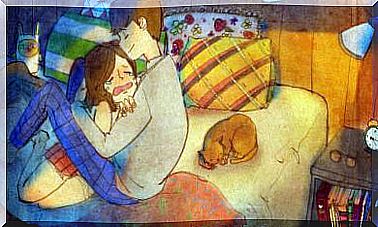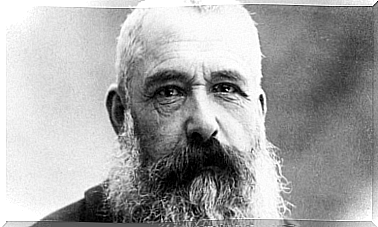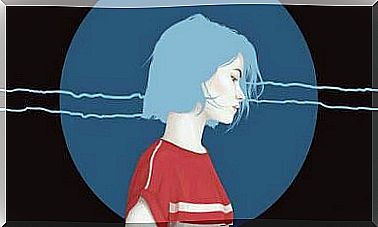What Is The Source Of Unhappiness?

Have you ever wondered what the source of unhappiness is? Where does it come from? Over time, countless books have been written about what happiness is and whether or not it is possible to achieve it. This gives us an idea of the importance we attach to it.
However, to date, no consensus has been reached. We also do not know what to do to maintain it. Is this possible? What does seem true is the almost constant perception that something is missing or how worried we are about a multitude of problems. And it is that discomfort occupies too large a space in our daily life.
Patching up unhappiness
There are many theories that revolve around suffering. Techniques are described to overcome fears, to live in the present, to ignore our thoughts, etc. However, in many cases an important question remains to be answered: why does our human nature tend to do just the opposite ? What is the origin of unhappiness?
Human beings settle for patching up our unhappiness, but we do not delve into the functioning of our emotions, thoughts or behaviors. We are not diving to the root of the matter.

First of all, we must accept one thing: nature does not care that we are happy. He does not care that we are fully aware at every moment, or that we invent fears, or that we adhere to our desires.
Therefore, nature is not interested in us being happy, but in surviving. And this, sometimes, is a contradiction. These two objectives, at times, collide resoundingly. We are like a child with a hammer in hand. Instead of building, this boy is dedicated to hammering everything around him, including himself. You do not know how the tool works or what it is for.
The origin of unhappiness
According to the researchers, the origin of unhappiness lies in four basic causes. What are these four basic causes? Let’s see them. We are born with useful ancestral tendencies. These tendencies (mental structures, emotional systems and behaviors) we develop as we grow. They were developed both to survive and to simplify, organize and give coherence to the outside world.
These tendencies take root in all of us, even more so when we observe them or suffer them during our life experiences. For the most part they are unconscious and automatic. If we don’t make good use of them, they can make us interpret the world by distancing ourselves from reality or taking us adrift in an emotional sea.
Second, these innate tendencies no longer serve in today’s world we live in. They served before, in a past time completely different from the current one. However, we continue to think and feel in the same way as the individuals of those times. This leads us to confuse our true needs.
Third, throughout evolution, innovations do not start from scratch. They overlap with existing features. Therefore, our brain consists of the most primitive brain to the most recent. They are all useful, but they can struggle to be in command and lead the person to become confused in their contradictions.
Finally, the lack of self-knowledge and the difficulties we have to overcome it make us disconnect from what is happening inside us. We are pushed by tides that hit us everywhere and we do not know how to take command.

Our useless innate tendencies
According to Eduard Punset, excellent behavior guidelines thousands of years ago are no longer useful, and yet they are still valid. On a physical level there are many examples of this: the wisdom tooth, the need to create a pantry of fat in our body …
We remain attentive, as thousands of years ago, to what we lack, to the mistakes we make, to the prejudices with which they are different from us even though we know that they are not dangerous. We also continue to want what the other has, even if it does not help us to survive. We have the same tendencies as our ancestors, but our societies have changed.
99% of our genes are similar to that of our ancestors. However, the evolution of our DNA and its manifestation is unfortunately slower than our technical, social, cultural, economic or scientific advances.
As we see, the origin of unhappiness seems to lie in our useless ancestral tendencies. Before they had a clear purpose. At the current evolutionary moment they are no longer so useful, sometimes leading us to major imbalances.









